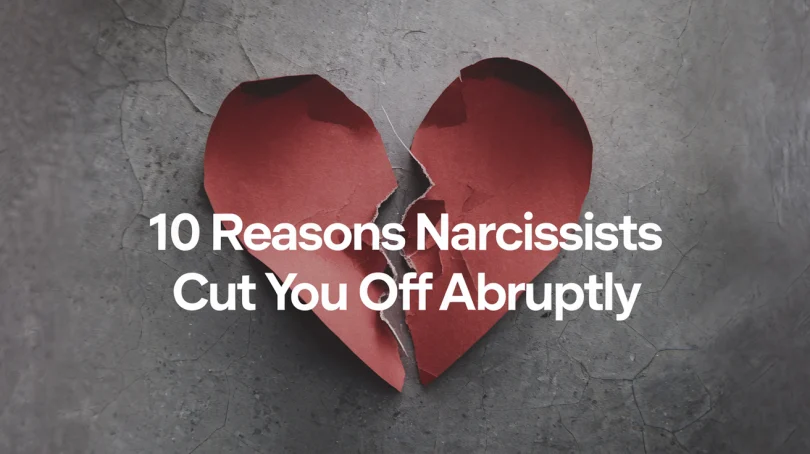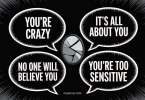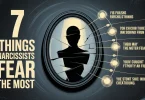Narcissists often end relationships abruptly, without any warning or explanation. And if they do explain, it is typically vague, self-serving, or full of blaming and shaming, leaving you feeling responsible, confused, and unworthy. They may offer you another chance to prove yourself, but often they remain cold and detached, quickly moving on to someone else as though you never mattered to them.
Number one is punishment for not living up to their unrealistic fantasies.
When a narcissist realizes that you’re a real person and you don’t fit perfectly with the fantasy image that they’ve created in their mind of the perfect partner, they start punishing you. But it’s not actually about you. To them, you’re just an avatar of someone in their mind, and the relationship is just a projection of their fairy-tale vision of a relationship.
So, when you fail to live up to these delusional expectations, the narcissist gets disappointed. They withdraw affection, lash out, and punish you. And it’s just their pattern. They start by putting every partner on a pedestal, making them their new soulmate, the center of their universe, just like they did with you.
But as the relationship gets real, the less it matches their fantasy world and the more they get disillusioned and start punishing you. Eventually, they may discard you and transfer their fantasy onto someone new who they believe will be the idealized partner that they’d imagined, and they just repeat the cycle.
Discover Related Topics:
9 ways to deal with toxic people
Top 5 Overlooked Dating Red Flags
Tactics NARCISSISTS Use To Confuse Conversations
5 Ways to STOP an Anxious Attachment
Number two is to maintain their self-image.
For a narcissist, controlling how they are perceived is everything. If you start seeing them for who they truly are and you’re no longer validating their grandiose self-image or in the case of a covert narcissist, their vulnerable victim identity they will discard you without hesitation.
One of the most unsettling aspects of a narcissistic discard is the cold way that they cut ties with you. It’s like you’ve been erased. And often, even before discarding you, they’ll start manipulating the narrative, painting you as the villain to anyone who will listen, to maintain control of how they and the situation is perceived by others.
Number three is to test you.
Narcissists view relationships as a power game. They will sometimes discard you just to test how hard you’re willing to work to please them and how far you’re willing to go to earn their love and approval back. It’s their way of reinforcing their control over you, keeping you in a constant state of uncertainty. And if you pass their test and you chase after them, trying to prove your worth, it boosts their ego.
They just love knowing that you’re willing to submit and sacrifice your needs and even your self-respect to keep them from leaving. Sometimes these discards never happen; they’re just threats. And when they do, sometimes it just lasts a day or two, maybe a week, usually while the narcissist goes out and seeks attention and validation from someone else.
These threats and temporary breaks are just another manipulation tactic designed to test you and make you feel like you’re constantly having to prove your worth and fight for them. You never know where you stand, and this uncertainty becomes exhausting. And in the end, after all that work, you’ll probably end up being discarded anyway, either emotionally or completely.
Number four: You’re too hard to manipulate.
A narcissistic discard is often a calculated move to manipulate you and show you just how easily you can be discarded and replaced. So, if you’ve stopped playing along with their games or stopped meeting their demands, they’ll discard you and move on to someone more compliant, who they believe will be easier to control.
That said, if you’re too easy to manipulate, they might discard you just as quickly, seeing you as not enough of a challenge and not useful in terms of feeding their ego. For a narcissist, if there’s no excitement or effort in manipulating and controlling you or there’s too much effort they will turn to someone else who can give them that sense of power and validation.
Number five is to avoid vulnerability.
Narcissists fear deep emotional connections because they threaten to expose their insecurities and weaknesses. In the early stages of a relationship, they often present as an idealized figure, maybe taking on a parental role, embodying the image of a nurturing, loving mother, for example, or in the case of a male narcissist, as a strong, confident, protective father.
These personas serve as a defense mechanism, masking the vulnerabilities that they are so desperately trying to hide. However, subconsciously, they often end up recreating these complex parent-child dynamics to go through the process of individuation, which is something they were not able to successfully do as children. So, as the relationship deepens and the emotional intimacy increases, their carefully constructed facade begins to crumble, revealing the fragile, insecure, and emotionally immature side that they’re trying to conceal.
This shift can trigger panic in the narcissist as they are confronted with the reality of their flaws and vulnerabilities. And for a narcissist, this feels like a threat to their very survival. So, rather than face the discomfort of being exposed, they will often choose to discard you instead.
Number six is to avoid rejection.
For a narcissist, even the smallest hint of rejection feels like a major blow to their ego. So, if you start to voice your concerns or set boundaries, they see it as a personal attack, as though you’re saying they’re not good enough.
Instead of seeing these conversations as a healthy part of any relationship, they feel like you’re rejecting them, which can cause them to shut down and emotionally discard you or completely discard you without warning, just to avoid abandonment, taking responsibility, or working through conflict constructively.
Number seven is the sense of entitlement.
Narcissists have a deep, deep sense of entitlement. They think the world owes them and revolves around them, and they feel like they deserve constant admiration, validation, attention, and emotional energy from others, regardless of how little they give in return.
They think everyone should be waiting on them hand and foot. And so, when you’re not catering to their needs and giving them that special treatment they feel they deserve even though they treat you they may discard you, making you feel like you failed them and that they deserve better than you.
Number eight is they have no emotional attachment to you.
Narcissists believe that love is about the highs that they get during the love-bombing phase, and they have no real capacity to bond with anyone on a deep emotional level. And that’s because they’ve rejected and abandoned their authentic self, often due to repeated experiences in childhood of emotional invalidation, manipulation, and abuse.
So, often the discard happens because the highs wore off, and they’re simply bored. And since their connection with you was shallow all along, it doesn’t feel like a great loss to them. It’s just part of the cycle and an opportunity to get those highs back from a new source of supply. But just like you, there will be no true emotional attachment with the next person either.
Number nine: They found a new supply.
Narcissists are always on the hunt for new sources of admiration, validation, and attention to fuel their insatiable egos. When they feel like they’ve exhausted you and there’s just nothing left to extract from you, they’ll often discard you to make space for someone new.
This new supply may seem more exciting or different, but it’s just another person to fill the void they feel inside and to play out their fantasy delusions. For many narcissists, this pattern of serial relationships or affairs is very common.
They jump from person to person, constantly seeking out someone who can give them that rush of admiration and praise. So, when they think they’ve found someone who can provide that, it’s game over for you.
Number 10 is to create more hoovering opportunities.
Narcissists don’t always come back, but they like to know that they can if they want to. So, they often keep old sources of supply in the wings in case they get bored or aren’t getting enough attention. So, they might continue checking in with you and playing games long after the relationship is over, preventing you from healing and moving on.
So, they might randomly reach out to you, trying to draw you back in with sudden displays of charm, attention, or other manipulation tactics. Hoovering can be especially dangerous because it creates false hope, making you think that they’ve changed and that the relationship has true potential. But it’s important to recognize that you’re just being sucked back into their vortex, and soon you will be spit out again.
In a normal breakup, both partners typically acknowledge the issues that led to the breakdown of the relationship. They can have honest conversations and take responsibility. And while it’s painful, it allows both people to get closure, heal, and move forward.
In contrast, with a narcissistic discard, there’s no empathy, accountability, or closure. The narcissist shifts all the blame onto you, leaving you feeling responsible, abandoned, and confused. They love to keep you stuck in the toxic cycle, preventing you from moving forward, which is why you have to close the door and give yourself closure.






